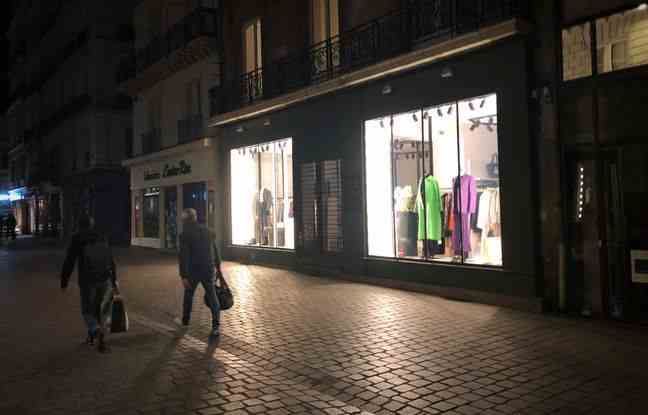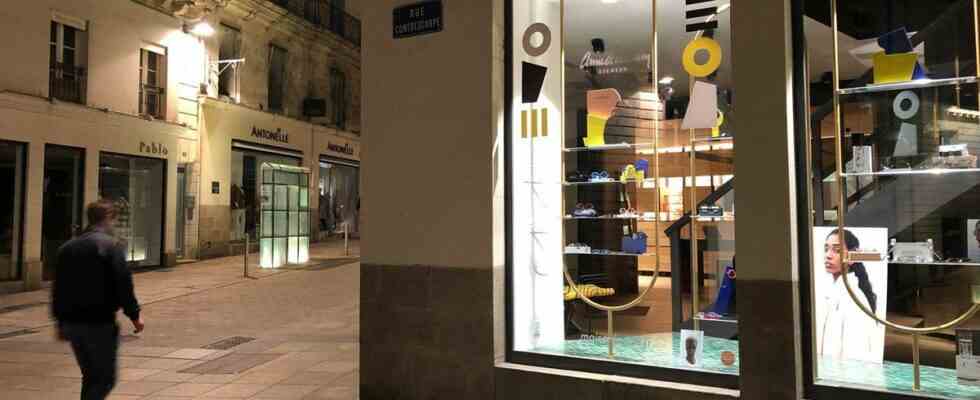There is the national regulation, little known, which requires the extinction of illuminated signs and advertisements at night, from 1 hour to 6 hours in the morning, as well as that of the shop windows, from 1 a.m. to 7 a.m. But, for more and more cities and metropolises, this is not enough in the fight against “light pollution” and the quest for “energy sobriety”. Like Grenoble, Lyon or Rennes, they have decided to go further by imposing local regulations more restrictive. With communication and sanctions at the key.
In Nantes, the new local advertising regulations adopted on June 30 thus requires the extinction of stores (signs and windows) from midnight. “It could have been earlier. This schedule is the result of discussions between professionals, associations and citizen panels,” explains Pascal Pras, vice-president of the metropolis. Three months later, what about the field? Are traders playing the game?
“These people are completely off the ground”
For the militant association Resistance to advertising aggression (RAP), the answer is rather “yes”. “The vast majority of traders turn off their windows and signs. Is it due to regulations, energy savings, environmental awareness? I don’t know, but there is clearly a positive development. Then it depends on the area. There are places where there seems to have been a ripple effect, others where there is still a lot of room for improvement, ”reports Lucas Lechat, member of RAP. “We still have bad students, recognizes the association of traders full center. But it moves more and more, either by conviction, or by pragmatism, that is to say to reduce its invoice. »
To find out for sure, we went to observe what was going on in the large city center of Nantes. After midnight, and even from 10 p.m., a large majority of stores are effectively off. The recalcitrant are found above all on the pedestrian plateau: ready-to-wear shops for the most part, but also an optician, a sandwich shop, a seller of hearing aids… Few signs lit, mainly shop windows, even a few screens broadcasting commercials to a deserted street. “It’s ridiculous, these people are completely off the ground,” commented a group of night owl students, in front of a chic clothing store bathed in light. “I admit that it reassures me to see lit windows when I pass in the evening, testifies a passerby. It feels like there is life. But it’s obviously nonsense in relation to ecology. »
“We’re tired of annoying people who work”
Contacted by 20 minutes to understand their reluctance, some offenders, most often franchisees, throw the ball back to their national headquarters. Others mention technical difficulties with the programming of the lighting. ” I do not know how to do. I have to look into the subject”, admits, embarrassed, a shopkeeper. A manager of women’s items gets angry. “All my bulbs have been replaced by LEDs. It consumes almost nothing! I’m tired of pissing off people who work. It is rather on the side of the multinationals that we must look for the waste. »

Aware of the challenge, the Nantes city center shopkeepers’ association has recruited a facilitator to work on questions of ecological transition. She is also associated with the association Living Brittany to broadcast an awareness video. “We recommend that members turn off the sign and the window as soon as the store closes, explains Camille, host of Plein center. There is a preconceived idea that still circulates is that by leaving your shop on, it can help attract additional customers. In reality, apart from rare counter-examples, the customer who finds himself in the streets after 10 p.m. does not have the objective of coming the next day to buy the products seen. They are also opposed to the importance of brand image. Today, we have an increasingly responsible clientele, concerned about the climate emergency. The risk of staying on at night is to project a negative image and to be singled out. »
Pedagogy before fines
On the side of Nantes Metropolis, it is indicated to show “pedagogy” at first. “Before verbalizing, we first go to meet traders when necessary. But the objective is clear: the lighting must stop at the times requested,” says Pascal Pras. Within a few weeks, minutes will therefore be drawn up. “A fine of 1,500 euros per device. That is to say that the store which combines a sign, a window or a screen, for example, is exposed to a heavier fine. In the event of a recurrence, it can go as far as dismantling the devices. »
The RAP association warns that it will be “vigilant” on compliance with the regulations. “Society has changed on the subject of light pollution,” says Lucas Lechat. When we do extinction actions, we get a lot of positive feedback. These lights create nuisances for local residents, divert the attention of motorists, not to mention the consequences on biodiversity. Everyone should be involved. »

